Questionnaires and surveys are both research methods used to gather information from a sample of people. However, there are important distinctions between the two methods. This blog post will explore the key differences between questionnaires and surveys, and provide tips on how to choose the right research method for your needs.
What are Questionnaires?
Questionnaires are a type of research method that involves asking questions to a group of people in order to gather information about a certain topic. Questionnaires can be administered in person, by phone, or online, and they can be used to collect data from large groups of people quickly and efficiently. Questionnaires are often used in market research, as they can be a great way to collect data about consumer preferences and opinions.
When creating a questionnaire, it is important to make sure that the questions are clear and concise, and that they are relevant to the topic being researched. Questionnaires can be an extremely useful tool for gathering information, but they should be used carefully in order to ensure that the results are accurate and reliable.
What are Surveys?
Surveys are a tool that researchers use to collect data from a large number of people. Surveys can be used to collect information about people’s behaviors, opinions, or demographics. Surveys are typically administered through face-to-face interviews, telephone calls, or online questionnaires. Surveys are an important tool for researchers because they allow for the collection of data from a large number of people in a relatively short amount of time. Surveys are also relatively inexpensive to administer, which makes them a popular choice for researchers on a budget.
However, surveys have some limitations. For example, surveys rely on people’s self-reported information, which may not always be accurate. Additionally, surveys only provide information about what people say they do, or think; they cannot necessarily be used to assess people’s actual behavior. Despite these limitations, surveys remain a useful tool for researchers who want to collect data from a large number of people.
Difference between Questionnaires and Surveys
Questionnaires and surveys are both tools that can be used to collect data from a group of people. However, there are some key differences between the two. Questionnaires are typically shorter than surveys, and they tend to be more focused on specific topics. Surveys, on the other hand, are usually longer and cover a wider range of topics. Additionally, questionnaires are typically administered in person, while surveys can be conducted in person, by phone, or online.
Finally, questionnaires are often used to gather data about people’s opinions or preferences, while surveys are more commonly used to collect factual information. Because of these differences, it’s important to choose the right tool for the job at hand. Questionnaires are best suited for gathering relatively simple data from a large group of people, while surveys are better for collecting more detailed information from a smaller group.
Conclusion
Questionnaires and surveys are two different research methods that have their own strengths and weaknesses. Questionnaires can be used to collect data from a large number of people, but they do not produce as much detail as surveys. Surveys are more time-consuming and expensive to administer, but they provide more detailed information about respondents’ opinions and experiences. Researchers should carefully consider the type of data they need before selecting a questionnaire or survey.


